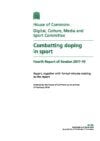There is overwhelming evidence of the widespread use of performance enhancing drugs in sport. Some are illegal in any respect; others are legal, but are used in suspicious ways. Whether permitted for selective use or banned outright, performance enhancing drugs can have serious consequences for the integrity of sport and the wellbeing of individual athletes. The huge increase in financial rewards for successful sports men and women carries the increased risk of incentives to use drugs to cheat. Our long inquiry has relied on detailed oral and written evidence, academic research, investigative journalism, and whistleblowers, to uncover this covert and pervasive activity across different sports. The inquiry studied both agencies responsible for policing the use of performance enhancing drugs, and the programmes that, as our report will demonstrate, have used them in questionable ways.
In particular, our inquiry has found acute failures in several different organisations in athletics and cycling: a failure to share appropriate medical records with anti-doping organisations; a failure to keep proper internal records of the medical substances given to athletes; and a failure to outlaw the use of potentially dangerous drugs in certain sports. All of these failures have occurred in an under-resourced national anti-doping infrastructure, which has had neither the financial means nor powers of enforcement. Some steps have been taken to alleviate this context and the failures it has permitted, but these measures have come too late. We call on those bodies identified in this report to pay serious attention to our recommendations; we cannot afford to allow these same failures to happen again.



Responses